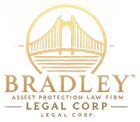Understanding Asset Protection: The Hybrid Bridge Trust
As wealth management becomes more complex in today’s financial landscape, effective asset protection strategies are increasingly crucial. One of the most innovative and effective tools in this area is the Hybrid Bridge Trust. This comprehensive asset protection trust combines the robust benefits of offshore asset protection with the tax efficiency of domestic trusts, offering a unique option for individuals seeking to safeguard their assets while maintaining compliance with U.S. tax regulations.
What is an Asset Protection Bridge Trust?
An Asset Protection Bridge Trust is a legal instrument designed to protect assets from creditors, lawsuits, and potential claims by utilizing a dual structure that incorporates both domestic and offshore elements. The term “bridge” refers to the trust’s ability to navigate between these two distinct legal environments, leveraging the advantages of each to create a more resilient asset protection strategy.
Why a Hybrid Asset Protection Trust like The Bridge Trust is the Gold Standard
The Bridge Trust elevates the standard asset protection trust by seamlessly merging the strengths of two powerful trust types. Lets compare the Offshore Trust vs. Domestic Trust.
1. Offshore Cook Islands Trust:
– Robust Asset Protection: Cook Islands trusts are renowned for their strong legal framework that provides unparalleled protection against creditors. The laws in the Cook Islands make it exceedingly difficult for creditors to access trust assets, allowing individuals to safeguard their wealth effectively. The Cook Islands Trust Act (enacted in 1984) was drafted for the sole purpose of making it very clear and very difficult for anyone other than the intended beneficiaries of the Trust to access the Trust assets! To do this, the Trust Act implemented very strong statutory hurdles.
There have been very few cases in which a plaintiff has actually tried to extract assets from a Cook Island Trust. In Every cases, they have failed to force an extraction of assets! This is true even when the Trust was drafted very poorly and when the Settlors where actually doing something illegal. Meaning, the Trust still worked. See FTC vs. Affordable Media case, otherwise famously known as the “Anderson Case.” As well as U.S. vs Grant and SEC vs Solow.
U.S. Courts have been frustrated at every turn whenever they have come up against a Cook Islands Trusts, but not a single court has ruled that the creation of a Trust is in any way illegal or immoral. In fact, just the opposite has occurred! for example, in one well-known asset protection case the court noted that the Trust was established “for the legitimate purpose of protecting family assets.” See Reichers vs. Reichers, No. 21833-94 (Weschester County Supreme Court., June 30, 1998) N.Y.L.J. (July 8, 1998.
– Privacy and Confidentiality: Offshore trusts often provide greater privacy, as they operate under the laws of a foreign jurisdiction, reducing the chance of prying eyes scrutinizing one’s assets.
2. Domestic Trust:
– Tax Simplicity: Domestic trusts, though they might not offer the same level of protection as their offshore counterparts, are usually simpler in terms of taxation and reporting requirements. A domestic trust benefits from established IRS guidelines, making it easier to manage tax implications without risking compliance issues.
– Accessibility and Flexibility: Individuals who opt for a domestic trust enjoy easier access to funds and assets, as domestic trusts tend to be regulated by familiar U.S. laws.
– Lack of Effectiveness: Sadly, as is the primary drawback of all domestic tools, they are ultimately subject to the U.S. Courts, Judges, Juries and Jurisdiction. This is the same for Domestic Asset Protection Trusts as well. Several domestic cases have shown how the DAPT’s have completely failed. See Battley vs. Mortensen, In re Huber, and Kilker vs. Stillman. I have fully briefed these cases in other articles. In all three of these cases the DAPT failed completely exposing all of the assets of the trust to the creditors. This has set a very disturbing precedent about how well a DAPT can hold up in court when it is seriously threatened.
Also, due to the case law, there is a question about whether the protection of the Settlor of the DAPT will hold if they are not a resident of that state. Many attorneys, including myself, have doubts that a Nevada Trust, Wyoming Trust, Delaware Trust or Alaska Trust is truly going to stand up to Federal District Court judgments.
The Benefits of Combining These Trusts
By synthesizing the strengths of both an offshore Cook Islands trust and a domestic trust, a Bridge Trust provides several key advantages:
– Comprehensive Protection: The combination allows for a layered approach to asset protection. The “Bridge” refers to the fact that one end of the Trust is firmly planted in the U.S. and the other is solidly planted in the best possible Offshore jurisdiction.
– Tax Efficiency: The hybrid structure maintains the tax benefits of domestic trusts while ensuring that asset protection measures are robust and resilient. Adequate planning can lead to tax advantages without compromising the trust’s safety features.
– Increased Peace of Mind: Individuals can enjoy the security of knowing their assets are protected from various threats, including lawsuits, creditor claims, and potential judgments, while also benefiting from the simplicity of managing taxes.
Key Considerations When Establishing a Hybrid Asset Protection Trust
– Legal Guidance is Essential: Given the complexities of asset protection, it’s imperative to work with experienced legal counsel knowledgeable in both domestic and offshore trust laws. An attorney can tailor the trust structure to fit your specific needs, ensuring maximum protection and compliance.
– Compliance with US Tax Laws: While The Bridge Trusts offer a strategic blend of protection and simplicity, adherence to IRS regulations is critical. Clients must ensure that all trust activities align with legal guidelines, avoiding pitfalls associated with tax evasion or reporting failures.
In the modern world of asset protection, The Bridge Trust stands as the gold standard, merging the formidable defenses of an offshore Cook Islands trust with the tax simplicity of domestic trusts. This innovative strategy empowers individuals to protect their wealth in a comprehensive and compliant manner.
If you are considering establishing a Hybrid Asset Protection Trust like the Bridge Trust or want to explore your asset protection options further, our law firm is here to help. We offer tailored legal solutions to help you safeguard your assets while ensuring compliance with all necessary regulations. Contact us today to learn more about how we can assist you in strengthening your asset protection strategy.
Call for a legal consultation and speak with an asset protection lawyer at (888) 773-9399
By: Brian T. Bradley, Esq.




